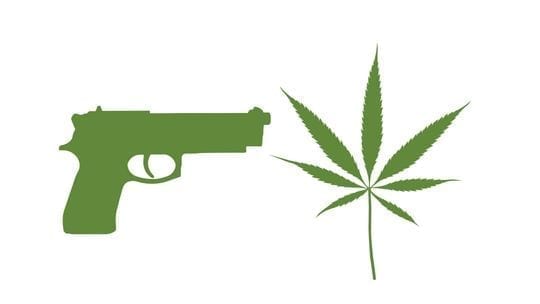By Randy Tucker
Guns or cannabis?
That’s the choice facing some medical marijuana patients as the first legal cannabis dispensaries in the Cincinnati area prepare to open in the coming weeks.
Federal law prohibits gun purchases or the possession of firearms by illegal drug users or addicts.
Surely, that doesn’t include registered medical marijuana patients in Ohio, does it?
Yup.
Federal law, which supersedes state statues, still classifies marijuana as an illegal Schedule 1 controlled substance.
Consequently, using or possessing marijuana and firearms at the same time is illegal, regardless of whether the state has passed legislation authorizing marijuana use for medicinal purposes.
“If I had a concealed carry (weapons permit) and medical marijuana, I would be very careful,” said Shelby County Sheriff John Lenhart, who sits on Ohio’s medical marijuana advisory committee. “I think citizens need to know there’s a possibility of getting into harm’s way.”
Most medical marijuana patients are unlikely to face charges for simply owning a gun and keeping it in their home, Lenhart said.
But he advised those patients applying to purchase firearms or carry concealed handguns to tread carefully.
Lenhart fears some patients may be tempted to skip questions about drugs during background checks because their medical marijuana use has been approved by the state.
And the forms used for background checks aren’t always clear about who should check “yes” when asked if they are an “unlawful user of, or addicted to” marijuana or any other controlled substance.
Form 4473 – used by the Bureau of Alcohol, Tobacco, Firearms and Explosives for background checks on firearm purchasers – carries a warning that medical marijuana is still considered federally illegal, without exception.
But the Ohio application for a license to carry a concealed handgun does not.
Omitting your medical marijuana use, even out of ignorance of the law, could leave you vulnerable to prosecution if it ever arises in court, said Paul Laufman, a criminal defense attorney in Cincinnati.
Lying on a background check form is a felony that can bring up to 10 years in prison and a $250,000 fine.
“People who are going to combine medical marijuana and guns are saying, OK, I’m making some decisions that could have some legal repercussions,” Laufman said. “This is all still somewhat of a gray area. Everything you’re doing here, you”re doing somewhat at your own peril.”
‘We’re trying to get answers’
The situation has created a conundrum for law enforcement officers across the country, particularly county sheriffs, who have the final say on who gets a concealed carry license.
In Ohio, county sheriffs issued 69,375 new licenses and 98,927 renewals last year, according to figures released Friday by the Ohio Attorney General’s office.
Overall, there are nearly 673,000 concealed carry license holders in the state, or about 1 in 17 Ohioans, based on Enquirer estimates.
By comparison, there were 12,873 registered medical marijuana patients in Ohio through the end of January, according to the most recent figures available from the Ohio Board of Pharmacy.
However, the pharmacy board estimated last summer that between 200,000 and 300,000 Ohioans will eventually register as medical marijuana patients.
And the numbers are expected to grow exponentially this year, the first full year of operation for the state’s Medical Marijuana Control Program.
New figures, including last month’s registrations, are expected to be released later this week, according to a pharmacy board spokesman.
Problems related to gun ownership and marijuana haven’t become a major issue yet, according to Butler County Chief Deputy Anthony Dwyer.
But it’s clearly on law enforcement’s radar.
“We’re trying to get answers before it becomes an issue on the street,” Dwyer said.
In the meantime, Butler County deputies are unlikely to charge gun-toting medical marijuana patients with a crime, unless a deputy suspects they’re under the influence of the drug while packing, Dwyer said.
“Carrying a weapon while under the influence, just like driving under the influence, is always a crime,” he said.
However, the sheriff refused to speculate on whether his department would eventually start cracking down on medical marijuana patients buying guns or obtaining concealed carry licenses unlawfully.
“We will act according to the guidelines being given to us by the government and our (county) prosecutor,” Dwyer said.
Facebook complaints, and a bill in Congress
Current guidance is ambiguous, at best.
According to an email from the attorney general’s office, sheriffs “should follow Ohio and federal law…and must make decisions as to who gets a (concealed carry) license based on the facts in front of them at the time.”
There’s just one problem with that advice – sheriffs can’t follow both state and federal laws regarding guns and marijuana because they disagree.
Cannabis advocates say the only real solution is to remove cannabis from Schedule I of the U.S. Controlled Substances Act.
Lawmakers on Capitol Hill recently introduced The Marijuana Justice Act of 2019, which would remove marijuana from the list of controlled substances and make it legal nationwide.
But similar legislation introduced over the past several years has failed to gain enought support to pass Congress.
Meanwhile, many gun owners and medical marijuana patients say they feel like they’re being short-changed.
In The Enquirer’s Ohio Medical Marijuana discussion group on Facebook, some members worry that they’ll have to give up their Second Amendment rights in exchange for medical marijuana.
Others say they feel like they’re being singled out, noting that patients legally prescribed opioid pain medicine and other narcotics don’t face the same barriers to buying or carrying a gun as they do.
“I understand where they are coming from,” said Clermont County Jail Administrator Joe Palmer, who also helps administer concealed carry handgun licenses. “These people (medical marijuana patients) are not criminals, per se. This is going to be a continuing issue until somebody does something for these people.”
Read more from the source: Cincinnati.com


